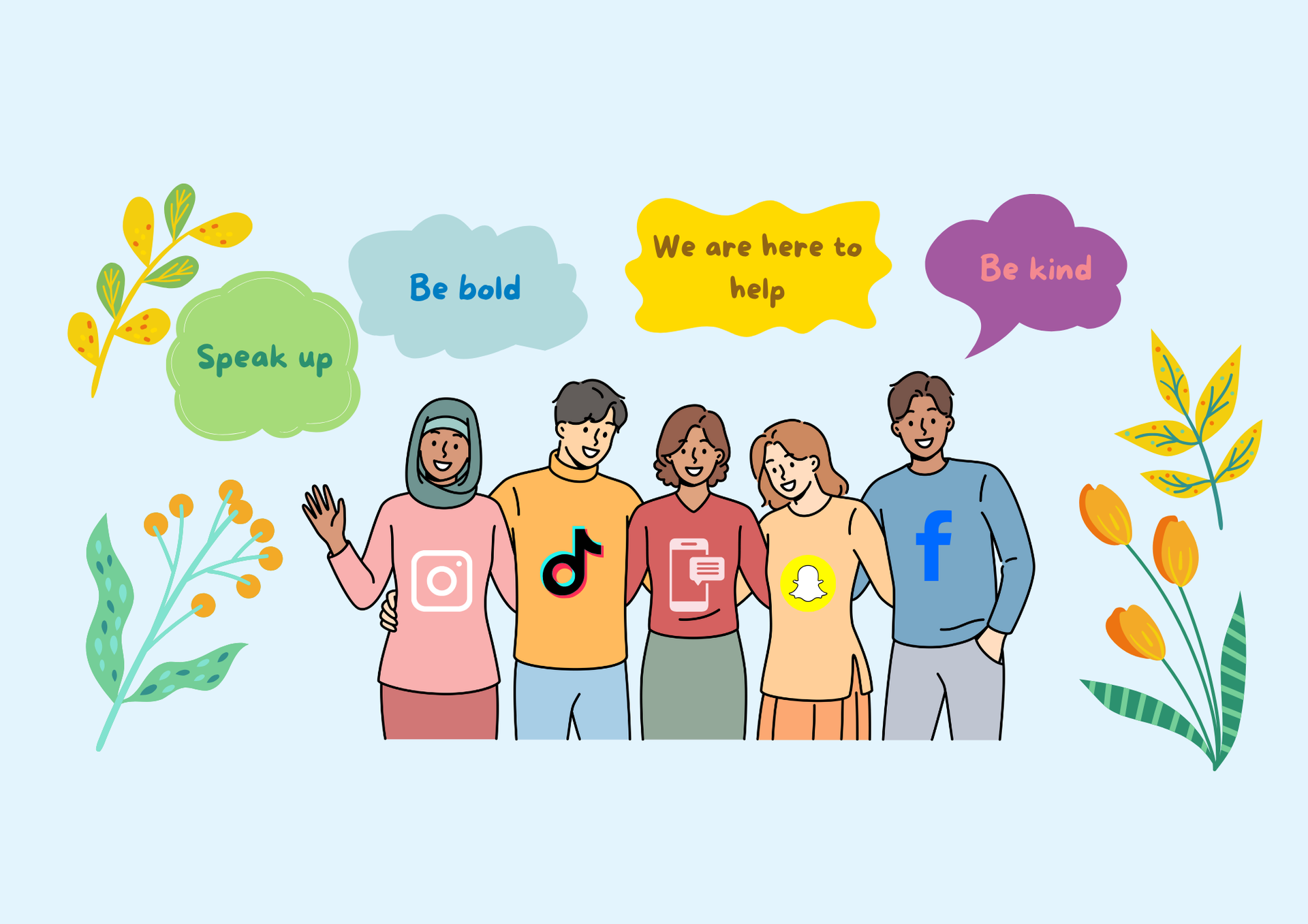Embracing Smiles
June 13, 2023

Embracing Smiles and Self-care for Inner Bliss Author: Priya Saikia
In our fast-paced and demanding world, it’s easy to get caught up in the daily hustle and forget to take care of the most important person in our lives – ourselves. We often prioritize work, relationships, and responsibilities but completely ignore our own well-being. Self-care is necessary to maintain balance, recharge, and cultivate a healthy relationship with ourselves. It is a necessity to ensure that our physical, emotional, and mental needs are met.
Let’s start by talking about the simplest way to start our self-care routine. Have you ever smiled at a stranger on the road? If not, give it a try. You’ll be amazed at how often they will smile back. Smiling is infectious, and therefore, it is amazing! When someone smiles at you, it can instantly uplift your mood and brighten your day. Moreover, there’s science behind this. When we smile, our brain releases endorphins, serotonin, and dopamine, which are neurotransmitters associated with happiness and well-being. This natural high helps keep us positive and enhances our overall sense of self-care. In this blog post, we will explore some of the incredible benefits of the simple act of smiling.
Reducing Stress and Anxiety
One of the most significant benefits of smiling is its ability to reduce stress and anxiety. Yes, you heard us right. This simple muscle movement can send signals to our brains that everything is okay, even during challenging situations. The physical act of smiling triggers the release of the stress-reducing hormone called cortisol, while also lowering our blood pressure and heart rate. By incorporating smiling into our self-care routines, we can effectively manage stress and cultivate a more relaxed state of being. So next time, when you’re stressed with deadlines, take a pause and smile. It might help you work much better.
Boosting Confidence and Self-Esteem
Self-care is not just about taking care of our physical health; it also involves nurturing our emotional well-being. And guess what, smiling can help in regard as well. This simple muscle movement plays a great role in boosting our confidence and self-esteem. When we smile, it conveys a sense of warmth, approachability, and self-assurance. It can help us feel more comfortable in social situations and improve our relationships with others. Moreover, remember that smiling can trick our brains into believing that we are happy, which in turn leads to a genuine increase in our overall sense of self-worth. Honestly, my own confident personality today is probably a result of a morning practice that my high school teacher taught me. She told me to wish myself a good morning with a bright smile every single morning right after I wake up and trust me, this practice has been so helpful in life that I do it even today.
Enhancing Physical Health
Believe it or not, smiling can also have a positive impact on our physical health. When we smile, our facial muscles are activated, which in turn stimulates blood flow and improves oxygenation. This increased circulation can contribute to healthier skin, as well as a more youthful and radiant appearance. Maybe, it is time to include smiling in our skin-care routine as well. Additionally, smiling can strengthen our immune system by reducing the levels of stress hormones that can weaken our body’s natural defence mechanisms. Basically, by smiling more, we can support both our physical and mental well-being.
Spreading Positivity and Connection
Self-care is not only about individual needs; it is also about our interactions with others. A simple smile can be a powerful tool for spreading positivity and fostering connections. When we smile at others, it creates a sense of warmth and openness, encouraging them to reciprocate and engage with us on a deeper level. This exchange of positive energy can enrich our relationships, create a supportive community, and enhance our overall self-care journey.
In the pursuit of self-care, we often overlook the simplicity and effectiveness of a smile. Smiling not only brings joy to ourselves but also radiates positivity to those around us. We are born with the ability to smile, yet we smile less and less as we age. By smiling more frequently every day, we can experience a wide range of benefits, from reducing stress and anxiety to boosting confidence and self-esteem. So, let’s remember to prioritize self-care and unleash the magic of a smile.
As Tom Wilson said, “A smile is happiness you’ll find right under your nose.”

Bullying No Way Week, taking place from August 11 to 15, 2025, is Australia’s leading initiative to help schools foster understanding of bullying behaviour and strengthen prevention strategies. With its empowering theme— "Be bold. Be kind. Speak up." —this campaign brings together government, families, schools, and communities to address bullying, especially the growing concern of cyberbullying in today’s digital world. By encouraging courage, kindness, and open communication, Bullying No Way Week reminds us that everyone has a role to play in preventing bullying and supporting those affected by it. Understanding Cyberbullying and Its Impact What is cyberbullying? Cyberbullying refers to harmful behaviours carried out through digital platforms—such as social media, messaging apps, emails, or online games. Unlike traditional bullying, cyberbullying can follow young people beyond school grounds and into their private spaces, often occurring at any time of day. It often begins with increased screen time on platforms like YouTube and can escalate to social media misuse. In response to growing concerns, the Australian Government recently passed legislation restricting YouTube access for children, highlighting the seriousness of the issue. According to the Australian Institute of Health and Welfare (AIHW): - In 2015–16, nearly 70% of children aged 12–13 experienced at least one instance of bullying-like behaviour within a year—impacting approximately 160,000 young people. - Between 2014–17, 1 in 5 Year 4 students reported experiencing weekly bullying. - An eSafety survey revealed that 1 in 4 children aged 8–12 had encountered unwanted contact or harmful material online. These aren’t just statistics they represent children who may be feeling anxious, isolated, or overwhelmed. Harmful messages, exclusion from group chats, or online rumours can deeply affect self-esteem, academic performance, and emotional wellbeing. The persistent nature of cyberbullying can feel relentless, making it essential for us to respond with empathy and a focus on safe, supportive environments. Last year, we hosted an event titled The Big Debate as part of the Youth Leaders Forum, exploring the provocative topic: Should social media be banned for individuals under 18? This engaging forum, organised by the Mental Health Foundation Australia, brought together young voices to reflect on the impact of digital platforms on youth mental health. The event is part of a broader initiative to promote awareness, critical thinking, and open dialogue around the intersection of technology and wellbeing. Practical Tips for Schools and Families Preventing cyberbullying is a shared responsibility. Here are practical, compassionate steps you can take drawn from Bullying No Way and AIHW resources: For Schools: - Create Safe Spaces for Dialogue - Foster inclusive environments where students feel safe sharing their experiences—through peer-led discussions, assemblies, or classroom conversations. - Promote Digital Citizenship - Use resources from eSafety to educate students on respectful online behaviour and how to safely report harmful conduct. - Update Anti-Bullying Policies - Ensure policies explicitly address cyberbullying with clear steps for reporting, support, and resolution. - Engage the Community - Organize workshops or events during Bullying No Way Week, inviting families and local organizations to learn about bullying prevention. For Families: - Listen Without Judgment - Create a safe, open space where children feel heard and supported when talking about their online experiences. - Teach Safe Online Habits - Help children protect their privacy—by avoiding oversharing and recognizing when to block or report harmful interactions. - Model Positive Behaviour - Demonstrate respectful, kind communication in your own online interactions. Children often emulate adult behaviour. - Know Support Resources - Familiarise yourself with services like Kids Helpline and eSafety for guidance on how to respond if your child is affected. Kids Helpline: A private, confidential 24/7 phone and online counselling service for young people aged 5–25. Call 1800 55 1800 – Available 24/7. For You: Steps to Stay Safe Online If you or someone you know is experiencing cyberbullying, here are some steps you can take to protect yourself: - Avoid Engagement - Responding to bullies may escalate the situation. Choosing not to engage often discourages them, as they usually seek a reaction. - Report Harmful Behaviour - Most platforms have reporting tools that allow you to flag cyberbullying. These reports can lead to content removal or account suspension. - Block the Offender - Blocking prevents further contact. Before doing so, take screenshots of the bullying content to preserve evidence. - Save the Evidence - Document threatening messages, images, or posts by taking screenshots or saving them securely. If keeping this material affects your wellbeing, send it to a trusted adult and remove it from your device. - Adjust Your Privacy Settings - Review and tighten privacy settings regularly to limit who can see or contact you. Restrict access from strangers or anyone making you uncomfortable. - Seek Support - Talk to someone you trust—such as a parent, teacher, school counsellor. Keep the conversation going until you feel safe and supported. We're here to support At the MHFA Wellness Hub, we offer compassionate, professional counselling services for children and adolescents who may have experienced different forms of bullying, including cyberbullying. Our caring provisional clinician provides a safe, non-judgmental space where students feel heard, valued, and supported. Every session is thoughtfully tailored to each student’s unique experience and emotional needs. Support is accessible, with individual sessions available for just $30. Learn more about Wellness Hub: https://wellnesshub.mhfa.org.au/ Cyberbullying can feel overwhelming, but no one has to face it alone. Together, by being bold, being kind, and speaking up, we can create safer digital spaces where all young people feel valued and protected. Every act of empathy, every listening ear, and every shared resource contributes to a future where kindness leads the way.

As the back-to-school season begins across Australia, many families are preparing for a fresh start, new classrooms, teachers, and friendships. This time can bring a mix of emotions: excitement, curiosity, and sometimes, uncertainty. It’s completely natural for both children and parents to feel this way. With a little planning and mindful support, we can help create a smoother, more positive transition into the school year for everyone involved. Starting a new school year is a big change. For some children, it may bring butterflies in the stomach, while for others, it may take a little longer to adjust. These feelings are valid and part of growing up. It’s also important to recognise that for families from diverse cultural or linguistic backgrounds, school transitions may come with extra layers such as navigating different expectations, adjusting to routines, or working through communication barriers. Creating understanding at home and at school can help children feel more secure and confident. Signs to Gently Notice: Children may express emotional discomfort in different ways, and sometimes, these signs are easy to overlook. You know your child best—trust your instincts and look for subtle changes, such as: Mood shifts or seeming quieter than usual Difficulty expressing what they’re feeling Withdrawing from favourite activities or friendships Changes in sleep, appetite, or daily habits Hesitation or worry about going to school These signals can be considered as an opportunity to connect with your child and offer extra support. Gentle conversations and open listening can make a big difference. And if you ever feel unsure, speaking with a school counsellor or mental health professional can help you feel more confident in supporting your child. Why Early Support Matters? Studies show that emotional wellbeing during childhood can have a lasting impact into later life. That’s why being proactive by offering reassurance, guidance, and safe spaces to talk can be incredibly powerful. There’s no need to wait until things feel overwhelming. Even small steps, taken early, can help children build resilience and feel more secure as they navigate life’s changes. Practical and Positive Ways to Support Your Child Here are some gentle strategies to support your child’s emotional wellbeing as the school year begins: Notice and acknowledge small changes. They may be telling you something important. Create space for open conversations. Ask how they’re feeling about school and let them know it’s okay to talk about worries even little ones. Work with the school team. Teachers, school staff, and counsellors can be valuable partners in your child’s wellbeing. Model calm and care. Creating a home environment that feels safe, inclusive, and encouraging helps children feel more grounded and supported. Dear Parents, You Matter Too. Transitions can be just as emotional for parents and caregivers. You are doing your best and that’s enough. Whether you’re navigating your own workload, changes at home, or the emotions that come with parenting, your feelings are valid too. Taking time to care for yourself is important. Whether it's talking to a friend, taking a quiet moment for yourself, or reaching out to a support service, looking after your own wellbeing helps the whole family thrive. We’re Here to Walk Alongside You At the MHFA Wellness Hub, we offer caring and professional counselling services for children and families navigating change. Our provisional clinicians work gently and respectfully with each family’s unique needs offering guidance, listening ears, and practical, evidence-informed strategies to help build emotional wellbeing. We believe every child deserves to feel heard, and every parent deserves to feel supported. Learn more about Wellness Hub: https://wellnesshub.mhfa.org.au/ Visit our website to explore free resources, and try the Supportive Mind App , designed to help children and parents manage everyday stress and emotional ups and downs in simple, compassionate ways. Let’s Begin This School Year with Confidence and Care Every school year brings new beginnings and with the right support, those beginnings can feel full of hope. Your child’s wellbeing matters. And so does yours. Written by Simranpreet Gill and Anne Bui

The nature of friendship There is no specific way to define what a ‘friendship’ is. Sometimes it’s a connection with the person you grew up with, or a group that shares your interests. But friendship also starts with a casual chat at work, a neighbour waving hello, or a familiar face you meet every day on the way home. That’s the beauty of it — there are no boundaries or limits to how friendships are formed. Navigating life changes is hard — but you don’t have to do it alone We’ve all gone through big life changes like moving somewhere new, starting over, or facing tough events. In fact, getting through those times on our own isn’t easy. Entering a new stage can ignite the feelings of loneliness and anxiety. That’s where good friends come in: they can be a real mental buffer against our negative emotions. Friendships offer emotional support by helping you feel truly seen and connected. They create a sense of belonging and strengthen your emotional resilience. Still, maintaining a friendship that stands the test of time and distance isn’t always easy. Communication with friends often gets disrupted as we move through unexpected changes. Sometimes, just one honest and open conversation is all it takes to rebuild the bridge — to remind each other that we’re still here, still listening. A good friend can validate your feelings, empower and inspire you to take steps. Friendships: the first relationship that shapes the rest Friendships are one of the first relationships we get to choose for ourselves. Spending time with people who are good for our developmental health is matter, as they play a huge role in shaping how we connect with others. Through friendship, we learn how to trust, how to support, and how to be present — lessons that carry into every other relationship we build. On this International Friendship Day, let’s take a moment to reflect on the power of friendship in supporting mental well-being and emotion, especially during life’s most challenging moments. Whether it’s a message, a call, or a quiet thank-you, let your friends and the person you care know how much they’ve mattered on your journey. Written by Anne Bui and Kylie Nguyen


